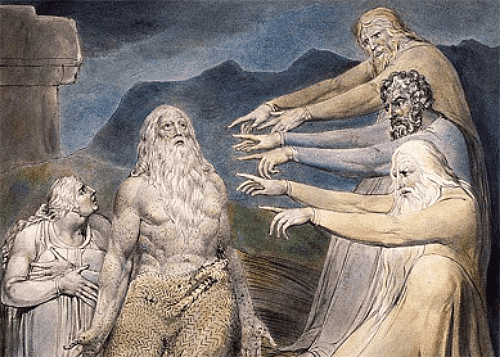Accusations, Forgiveness & Advocacy
What have Jesus Christ and His true prophets taught about accusations, forgiveness, advocacy and the horrific demands of justice? When we act as “Devil’s advocate” by holding grudges, witholding forgiveness and “reviling against revilers,” we assist in the adversary’s work as the accuser. When we forgive others and extend the hand of mercy, we become like Christ in a far more profound way than we may realize.
Watch the video presentation
Accusations
Accusing & Condemning Others
Many times, wicked men (including the popular religious leaders in Christ’s day) seek to catch men in a snare of their own words, with the intention of accusing or condemning them. When we do the same to others, we become their accusers, which is evil.
In this example, Pharisees are questioning Jesus with the intention of accusing Him. They need an accusation against Him to execute Him.
John 8:3-8 (KJV)
3 And the scribes and Pharisees brought unto him a woman taken in adultery; and when they had set her in the midst,4 They say unto him, Master, this woman was taken in adultery, in the very act.
5 Now Moses in the law commanded us, that such should be stoned: but what sayest thou?
6 This they said, tempting him, that they might have to accuse him. But Jesus stooped down, and with his finger wrote on the ground, as though he heard them not.
7 So when they continued asking him, he lifted up himself, and said unto them, He that is without sin among you, let him first cast a stone at her.
8 And again he stooped down, and wrote on the ground.
Jesus knows that He’s the only one that’s mastered God’s law by being sinless. Nobody else was sinless, therefore He was teaching the Pharisees and the public that only He who is without sin may judge righteously. Jesus is the only rightful judge.
John 8:9-11 (continued)
9 And they which heard it, being convicted by their own conscience, went out one by one, beginning at the eldest, even unto the last: and Jesus was left alone, and the woman standing in the midst.10 When Jesus had lifted up himself, and saw none but the woman, he said unto her, Woman, where are those thine accusers? hath no man condemned thee?
11 She said, No man, Lord. And Jesus said unto her, Neither do I condemn thee: go, and sin no more.

Notice that Jesus makes “accusations” synonymous with “condemnation.” When we accuse someone, we are condemning them. Jesus neither condemned nor accused this woman who was taken in adultery. Rather, Jesus was the advocate for her.
Satan is An Accuser
In Revelation 12, John describes Satan as “the accuser of our brethren” and states that Satan makes accusations “before our God day and night.”
Revelation 12:9-12 (KJV)
9 And the great dragon was cast out, that old serpent, called the Devil, and Satan, which deceiveth the whole world: he was cast out into the earth, and his angels were cast out with him.10 And I heard a loud voice saying in heaven, Now is come salvation, and strength, and the kingdom of our God, and the power of his Christ: for the accuser of our brethren is cast down, which accused them before our God day and night.
11 And they overcame him by the blood of the Lamb, and by the word of their testimony; and they loved not their lives unto the death.
12 Therefore rejoice, ye heavens, and ye that dwell in them. Woe to the inhabiters of the earth and of the sea! for the devil is come down unto you, having great wrath, because he knoweth that he hath but a short time.

The work of the devil (called “our adversary”) is to accuse us of breaking the laws of God. He does this in hopes of prosecuting us, according to the laws of justice. The law of justice is a horrific law that will destroy all and separate us from God forever.
None of us want to be tried and convicted according to justice, because “all have sinned and fall short of the glory of God” (Romans 3:23).
However, Satan wants all of us tried with accusations of disobedience to the law. Why? Because if we are convicted, we become sealed to Satan as his angels (2 Nephi 9:8-9, Alma 34:35).
Jesus Christ is Not An Accuser
John 3:16 is perhaps one of the most famous scriptures. However, the following verse contains a critical attribute regarding Christ and His relationship to us as an advocate that will not condemn us.
John 3:17 (KJV)
17 For God sent not his Son into the world to condemn the world; but that the world through him might be saved.In the verse below, we see that Christ is the advocate power that can dismiss the condemning accusations that Satan seeks to prosecute us with.
Colossians 2:14 (KJV)
14 Blotting out the handwriting of ordinances that was against us, which was contrary to us, and took it out of the way, nailing it to his cross;Colossians 2:14 (NIV)
14 having canceled the charge of our legal indebtedness, which stood against us and condemned us; he has taken it away, nailing it to the cross.Colossians 2:14 (NLT)
14 He canceled the record of the charges against us and took it away by nailing it to the cross.In the following verse, we get another indication that Jesus Christ is not an accuser.
John 5:44-46 (JST / Inspired version)
44 How can ye believe, who seek honor one of another, and seek not the honor which cometh from God only?45 Do not think that I will accuse you to the Father; there is Moses who accuseth you, in whom ye trust.
46 For had ye believed Moses, ye would have believed me: for he wrote of me.
47 But if ye believe not his writings, how shall ye believe my words?
However, in the verse above, Jesus indicates that Moses is the Pharisee’s accuser. Why? Because the Pharisees are seeking the appeal of the law of Moses for justice against Jesus. Remember, Jesus taught that “for with what judgment ye judge, ye shall be judged: and with what measure ye mete, it shall be measured to you again” (Matthew 7:2).
Since the Pharisees were seeking to accuse and condemn Jesus according to the law of Moses, Jesus was reminding them that Moses’s law would accuse, condemn and judge them also.
Are the Servants of God Accusers?
King Benjamin spoke of the sins of his generation, and urged his people to overcome them through Christ. However, this was not an accusation. Rather, he was clearing his conscience before God, that the blood and sins of that generation would not come upon him (Jacob 1:19).
Mosiah 2:15 (Book of Mormon)
15 Yet, my brethren, I have not done these things that I might boast, neither do I tell these things that thereby I might accuse you; but I tell you these things that ye may know that I can answer a clear conscience before God this day.If we recall the Revelation 12 scripture we already covered, how did the brethren overcome the accusations of Satan?
Revelation 12:9-12 (KJV)
10 …for the accuser of our brethren is cast down, which accused them before our God day and night.11 And they overcame him by the blood of the Lamb, and by the word of their testimony; and they loved not their lives unto the death.

True servants of God are not accusers. They preach with boldness and with the power of the Spirit diligently, so that Christ can remiss and expunge Satan’s accusations. True servants are advocates for their people, and do not seek their condemnation by making accusations to God. They work tirelessly, preaching to their people so that they too may have a chance to learn about and apply Christ’s mercy.
These are the fruits of a true servant.
Are the Servants of the Devil Accusers?
The servants and followers of the devil will seek to accuse others. In many places in scripture we have a precedent for this most often occurring among religious leadership. In Christ’s time, the popular and sustained religious leaders sought to disfellowship and otherwise publicly shame Christ and His followers with accusations.
Mark 3:2 (KJV)
2 And they watched him, whether he would heal him on the sabbath day; that they might accuse him.Luke 11:52-54 (KJV)
52 Woe unto you, lawyers! for ye have taken away the key of knowledge: ye entered not in yourselves, and them that were entering in ye hindered.53 And as he said these things unto them, the scribes and the Pharisees began to urge him vehemently, and to provoke him to speak of many things:
54 Laying wait for him, and seeking to catch something out of his mouth, that they might accuse him.

In some extreme cases, the accusations were justification for murdering someone, such as in the case with King Noah’s quorum of the Twelve high priests and Abinadi.
Mosiah 17:11-12 (Book of Mormon)
11 And now king Noah was about to release him, for he feared his word; for he feared that the judgments of God would come upon him.12 But the priests lifted up their voices against him, and began to accuse him, saying: He has reviled the king. Therefore the king was stirred up in anger against him, and he delivered him up that he might be slain.
Notice that Abinadi’s crime was not preaching to Word among them. Rather, it was Abinadi’s dissidence with the religious leaders of the community. These priests of Noah were more concerned with hiding their church’s abominations and hypocritical works from the eyes of the public than the truth, as taught from a true prophet of God.
How the Church is Commanded to Handle Accusations
One receives forgiveness from God when they repent. However, in the revelations given to Joseph Smith in 1831, the Lord states how to deal with unrepentant people within the church.
D&C 64:12 (September 11, 1831)
12 And him that repenteth not of his sins, and confesseth them not, ye shall bring before the church, and do with him as the scripture saith unto you, either by commandment or by revelation.13 And this ye shall do that God may be glorified—not because ye forgive not, having not compassion, but that ye may be justified in the eyes of the law, that ye may not offend him who is your lawgiver—
14 Verily I say, for this cause ye shall do these things.
The church is supposed to bring the accused (and the accuser) before the church and deal with them according to what is written in the scriptures. The scriptures! Not a handbook of policies or the one-off recommendations of a General Authority. Do what the scriptures say. And what do the scriptures say?
D&C 102:18 (February 17, 1834)
18 In all cases the accuser and the accused shall have a privilege of speaking for themselves before the council, after the evidences are heard and the councilors who are appointed to speak on the case have finished their remarks.19 After the evidences are heard, the councilors, accuser and accused have spoken, the president shall give a decision according to the understanding which he shall have of the case, and call upon the twelve councilors to sanction the same by their vote.
The accuser and the accused must both stand together and give their testimonies to the council.
Judge Righteous Judgement
Jesus and His prophets are to judge righteously and bind and seal their testimonies upon the people as a witness against them. Keeping the same metaphor of the court room, is a witness of one’s abominations the same as an accusation? No. Because the judge (Jesus, in this case) calls forth the witnesses, and it is within His law that witnesses testify. “By the mouth of two or three witnesses every word shall be established” (2 Corinthians 13:1).
Is Judging the Same As Accusing?
Consider that Jesus Himself pointed out the hypocrisy of the Pharisees, and sent the disciples to witness against them, asking them for an accountability for their misaligned deeds. This was not an accusation, as Jesus sent them to ask the Pharisees why they did that.
Matthew 7:1-5 (KJV)
+1 Judge not+, that ye be not judged+.2 For with what judgment ye judge, ye shall be judged: and with what measure ye mete, it shall be measured to you again.
3 And why beholdest thou the mote that is in thy brother’s eye, but considerest not the beam that is in thine own eye?
+4 Or how wilt thou say to thy brother, Let me pull out the mote out of thine eye; and, +behold, a beam is in thine own eye?
5 Thou hypocrite, first cast out the beam out of thine own eye; and then shalt thou see clearly to cast out the mote out of thy brother’s eye.
Matthew 7:1-8 (JST / Inspired version)
1 Now these are the words which Jesus taught his disciples that they should say unto the people.2 Judge not unrighteously, that ye be not judged; but judge righteous judgment.
3 And why beholdest thou the mote that is in thy brother’s eye, but considerest not the beam that is in thine own eye?
4 And again, ye shall say unto them, Why is it that thou beholdest the mote that is in thy brother’s eye, but considerest not the beam that is in thine own eye?
5 Or how wilt thou say to thy brother, Let me pull out the mote out of thine eye; and canst not behold a beam in thine own eye?
6 And Jesus said unto his disciples, Beholdest thou the scribes, and the Pharisees, and the priests, and the Levites? They teach in their synagogues, but do not observe the law, nor the commandments; and all have gone out of the way, and are under sin.
7 Go thou and say unto them, Why teach ye men the law and the commandments, when ye yourselves are the children of corruption?
8 Say unto them, Ye hypocrites, first cast out the beam out of thine own eye; and then shalt thou see clearly to cast out the mote out of thy brother’s eye.
What is Righteous Judgement?
In the inspired version of Matthew 7:1-8 (cited above), Joseph Smith restred portions of the story that show that these disciples went to the Pharisees to “judge righteous judgment” (Christ’s judgement).
If our judgements are in line with Christ’s law, then those judgements are righteous, by definition.
Titus 2:3 (KJV)
3 The aged women likewise, that they be in behaviour as becometh holiness, not false accusers, not given to much wine, teachers of good things;Luke 3:14 (KJV)
14 And the soldiers likewise demanded of him [Jesus], saying, And what shall we do? And he said unto them, Do violence to no man, neither accuse any falsely; and be content with your wages.Matthew 5:10-12 (KJV)
11 Blessed are ye, when men shall revile you, and persecute you, and shall say all manner of evil against you falsely, for my sake.12 Rejoice, and be exceeding glad: for great is your reward in heaven: for so persecuted they the prophets which were before you.
Unrighteous judgement is:
- Judging unjustly
- Making false accusations
- Calling good evil, and evil good
- Mistaking gifts of the spirit with the gifts of darkness
How to Judge Righteous Judgement
Moroni taught us how to judge righteous judgement, and it’s pretty simple:
Moroni 7:12-15 (Book of Mormon)
12 Wherefore, all things which are good cometh of God; and that which is evil cometh of the devil…13 But behold, that which is of God inviteth and enticeth to do good continually; wherefore, every thing which inviteth and enticeth to do good, and to love God, and to serve him, is inspired of God.
14 Wherefore, take heed, my beloved brethren, that ye do not judge that which is evil to be of God, or that which is good and of God to be of the devil.
15 For behold, my brethren, it is given unto you to judge, that ye may know good from evil; and the way to judge is as plain, that ye may know with a perfect knowledge, as the daylight is from the dark night.

Moroni also taught that everybody has the ability to clearly know good from evil through the Spirit of Christ.
Moroni 7:16-17 (Book of Mormon)
16 For behold, the Spirit of Christ is given to every man, that he may know good from evil; wherefore, I show unto you the way to judge; for every thing which inviteth to do good, and to persuade to believe in Christ, is sent forth by the power and gift of Christ; wherefore ye may know with a perfect knowledge it is of God.17 But whatsoever thing persuadeth men to do evil, and believe not in Christ, and deny him, and serve not God, then ye may know with a perfect knowledge it is of the devil; for after this manner doth the devil work, for he persuadeth no man to do good, no, not one; neither do his angels; neither do they who subject themselves unto him.
Things that are righteous fit these descriptions, and can be accurately judged as such:
- “are good”
- “come from God”
- “inviteth and enticeth to do good continually”
- “to love God and to serve him”
- “to persuade to believe in Christ”
- “is sent forth by the power and gift of Christ”
Who is a Righteous Judge?
There is one worthy to judge, and that’s Christ. Although we are to judge righteously (meaning according to Christ’s law), only He is the righteous judge and the lawgiver.

James 5:9 (KJV)
9 Do not complain, brethren, against one another [accuse], so that you yourselves may not be judged; behold, the Judge is standing right at the door.John 5:22,27 (KJV)
22 For not even the Father judges anyone, but He has given all judgment to the Son,…27 and He [God] gave Him [Christ] authority to execute judgment, because He is the Son of Man.
John 8:7 (KJV)
7 So when they continued asking him, he lifted up himself, and said unto them, He that is without sin among you, let him first cast a stone at her.Forgiveness
If we can’t judge and we shouldn’t accuse, what should we do when there’s a wrongdoing against ourselves or others? The answer is forgiveness. This is our work to accomplish and its a commandment from Jesus.
Why Does Jesus Ask Us to Forgive?
D&C 64:2-3,13-14 (September 11, 1831)
2 For verily I say unto you, I will that ye should overcome the world; wherefore I will have compassion upon you.3 There are those among you who have sinned; but verily I say, for this once, for mine own glory, and for the salvation of souls, I have forgiven you your sins.
…
13 And this ye shall do that God may be glorified—not because ye forgive not, having not compassion, but that ye may be justified in the eyes of the law14 Verily I say, for this cause ye shall do these things.
We see above that there are 2 things that Jesus told us were the reasons for forgiveness:
- “that ye should overcome the world”
- “for mine own glory”
- “for the salvation of souls”
To Be Unforgiving is the Greater Sin
Forgiveness is a big deal to the Lord. It’s not optional for those who call themselves His disciples. In fact, Jesus taught Joseph Smith that the ancient disciples had trouble with this issue of being unforgiving towards each other in their hearts. And these unforgiving disciples paid the price.
D&C 64:8-9 (continued)
8 My disciples, in days of old, sought occasion against [accused] one another and forgave not one another in their hearts; and for this evil they were afflicted and sorely chastened.9 Wherefore, I say unto you, that ye ought to forgive one another; for he that forgiveth not his brother his trespasses standeth condemned before the Lord; for there remaineth in him the greater sin.
Did you catch that? Unforgiving people “stand condemned before the Lord” and retain the greater sin than the original trespass that they’re holding a grudge for!
We Are Required to Forgive All Men
Because Jesus is the judge, He does not have to forgive anyone (unless he chooses to do so based on the conditions of repentance). But we are not the judge, and we all must forgive all men.
D&C 64:10-11 (continued)
8 My disciples, in days of old, sought occasion against [accusations] one another and forgave not one another in their hearts; and for this evil they were afflicted and sorely chastened.9 Wherefore, I say unto you, that ye ought to forgive one another; for he that forgiveth not his brother his trespasses standeth condemned before the Lord; for there remaineth in him the greater sin.
Instead of forgiving whole-heartedly, some disciples made accusations against (“sought occasion against”) their brethren, which God calls evil. The disciples were chastised and afflicted because of this condemnation before the Lord.
Let’s be clear about this: Forgiving all people their trespasses against you is a commandment.
Erring in Doctrine & Forgiving False Doctrine Believers
Can believing something that’s false be a sin? What if someone believes and teaches something that you disagree with? How did Joseph Smith deal with people that believed things differently or disbelieved the tenets and teachings of the Lord’s church?
Joseph Smith (March 20, 1839)
“If I esteem mankind to be in error, shall I bear them down? No. I will lift them up, and in their own way too, if I cannot persuade them my way is better; and I will not seek to compel any man to believe as I do, only by the force of reasoning, for truth will cut its own way.” (letter to Edward Partridge and Church, HC 3:303–4)Joseph Smith (March 22, 1839)
“The first and fundamental principle of our holy religion is, that we have the right to embrace all, and every item of the truth, without limitation or without being circumscribed or prohibited by the creeds and superstitious notions of men.” (letter to Isaac Galland)Joseph Smith (April 8, 1843)
“I never thought it was right to call up a man and try him because he erred in doctrine. It looks too much like Methodism and not like Latter-day-Saintism. Methodists have creeds which a man must believe or be kicked out of their church. I want the liberty of believing as I please. It feels so good not to be trammeled. It doesn’t prove that a man is not a good man because he errs in doctrine.” (JS Collection, CHL)Forgiving Unrepentant Repeat Offenders
God has revealed some specific instructions for His disciples, in regards to those who continually trespass or wrong people. Here’s what He says:
D&C 98:38-45 (August 6, 1833)
38 Behold, this is an ensample unto all people, saith the Lord your God, for justification before me.39 And again, verily I say unto you, if after thine enemy has come upon thee the first time, he repent and come unto thee praying thy forgiveness, thou shalt forgive him, and shalt hold it no more as a testimony against thine enemy—
40 And so on unto the second and third time; and as oft as thine enemy repenteth of the trespass wherewith he has trespassed against thee, thou shalt forgive him, until seventy times seven.
41 And if he trespass against thee and repent not the first time, nevertheless thou shalt forgive him.
42 And if he trespass against thee the second time, and repent not, nevertheless thou shalt forgive him.
43 And if he trespass against thee the third time, and repent not, thou shalt also forgive him.
44 But if he trespass against thee the fourth time thou shalt not forgive him, but shalt bring these testimonies before the Lord; and they shall not be blotted out until he repent and reward thee four-fold in all things wherewith he has trespassed against thee.
45 And if he do this, thou shalt forgive him with all thine heart; and if he do not this, I, the Lord, will avenge thee of thine enemy an hundred-fold;
This is the summary of how we are to deal with repeat offenders according to the revelation:
- Forgive “seventy times seven” for those who repent
- Forgive 3 times for those who are unrepentant in their trespasses against you
- If the person trespasses again a 4th time and doesn’t repent, bring the testimonies before the Lord and His trespasses will not be blotted out unless they repent and reward 4x
- If the person repents, forgive them with all thy heart.
- When the person doesn’t repent, let the Lord avenge you of your enemy 100x
Dealing with Those Who Revile Against Us
D&C 19:29-30 (Summer 1829)
29 And thou shalt declare glad tidings, yea, publish it upon the mountains, and upon every high place, and among every people that thou shalt be permitted to see.30 And thou shalt do it with all humility, trusting in me, reviling not against revilers.
1 Peter 2:23 (KJV)
23 Who, when he [Christ] was reviled, reviled not again; when he suffered, he threatened not; but committed himself to him that judgeth righteously [God]:Mercy
Blessed Are the Merciful
The law of Christ teaches that mercy is the higher law. Christ’s disciples are charged to avoid accusations and offer mercy to those who are under the bondage of sin.
3 Nephi 12:7 (Book of Mormon) / Matthew 5:7 (KJV)
7 And blessed are the merciful, for they shall obtain mercy.Joseph Smith taught what righteousness really is:














